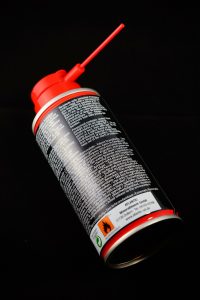 Most people shrug off a loud screeching garage door. After putting up with it for so long, it’s normal to think that’s just what garage doors do. In actuality, a noisy garage door is a sign that it’s past due for lubrication. If you want to ensure your garage runs smoothly, routine lubrication can make all the difference. However, choose the wrong lubricant and you risk damaging your door further. Here’s the general guidelines when it comes to choosing a garage lubricant.
Most people shrug off a loud screeching garage door. After putting up with it for so long, it’s normal to think that’s just what garage doors do. In actuality, a noisy garage door is a sign that it’s past due for lubrication. If you want to ensure your garage runs smoothly, routine lubrication can make all the difference. However, choose the wrong lubricant and you risk damaging your door further. Here’s the general guidelines when it comes to choosing a garage lubricant.
Should I Use Garage Door Oil or Grease?
- Oil: A standard lubricating oil can work well on a garage’s moving parts. It can deeply penetrate into bearings and mechanical hardware. However, oil can be quite messy. It’s a liquid substance that literally pours out of a bottle. It’ll drip all over your garage floor and possibly even onto your car. You also risk over lubricating the garage, which can be just as bad as having none.
- Grease: Grease does not work well when it comes to exposed parts which are normally found in garage doors. It attracts dirt and dust, which will eventually cause a buildup of grime in the garage parts. This can ultimately affect the operation of your door and is difficult to clean off.
- WD-40: This popular aerosol spray is frequently used to lubricate doors and is made of oil and solvents. Contrary to popular belief, WD-40 is not a lubricant. It’s a solvent which dissolves rust and grime. Smoother operation of lubed parts actually come from the cleaning action that this spray offers. It’ll strip out the oil, which results in a metal-to-metal contact of your garage parts. This will cause increased wear and tear to your garage and is thus not recommended for lubrication. You can use WD-40 to clean garage roller tracks as long as you use proper lubrication afterwards.
- White Lithium Grease: Opposed to regular grease, white lithium grease is composed of an oil and soap mixture and is commonly found in aerosol cans. Lithium grease is a great choice for garage parts. It’s long-lasting, resistant to temperature fluctuations, and handles friction well.
- Silicone: Another great option, silicone sprays work well on mechanical parts. Like lithium grease, silicone withstands temperature and lasts a long time. As an added bonus, it can reach difficult spots to lube and provides waterproofing to your garage parts.
While these are the standard types of lubricating compounds you’ll find in a hardware store, there’s also an assortment of proprietary solutions offered by different companies. It’s easy to get overwhelmed with choices here, so try to keep things simple. As long as you stick with a white lithium grease or silicone, your garage door will be in great shape.
How To Lube a Garage Door The Right Way
No matter what lube you choose, proper garage door lubrication is key to long lasting and smooth operation. By following these easy steps, you can be assured your door will stay in tip top condition.
Step-By-Step Maintenance Tips For Oiling Parts
- Start by cleaning up your garage door and parts. Using a vacuum and brush, remove loose debris in the track area. Afterwards, use a lightly damp cloth to clean off any grime.
- Spray lubricant on your garage spring typically found above the door. Be careful as these springs are under heavy tension. Don’t stick your fingers in the spring.
- Your garage track should not be oiled as it can hinder performance. You can add a small amount of oil on the inside of the garage rollers. These are wheels that are connected to the track.
- Apply lube to steel hinges, chains, and latches.
- If you have pulleys then you can add lubricant to the bearings in the center. There’s normally 2 pulleys on each side of the door.
Finishing It Up
Too much lubrication is just as bad as having none. If your garage parts are soaked with oil and/or dripping, you probably did too much. Wipe down any excess with a cloth. You may need to tighten up any bolts or screws that became loose during the oiling. Once done, try operating your door a few times. It should be much quieter and function smoother. If you’re still having troubles, there may be a problem elsewhere. Give your local garage repair company a call if problems persist.
